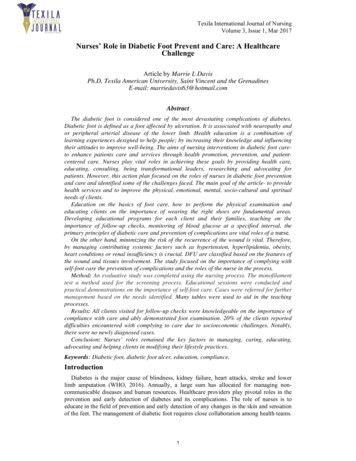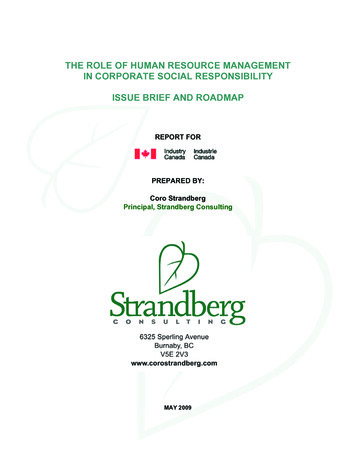
Transcription
The Role of aSchool Governor .
About Governors for SchoolsGovernors for Schools exists to improve educational standards sothat children and young people have the chance to realise their fullpotential. We believe the key to improving school performance iseffective governance. By finding, nurturing and supporting a committednetwork of governors we help to drive systematic change in howschools operate.Since 1999, we have been connecting schools across England with skilledand committed volunteers, supported by our business and universitypartnerships.“Trustees and governorsare, in my view, the unsungheroes of the system.”Sir David CarterNational Schools CommissionerBecome a y
What does a school governor do?Governors are responsible for overseeing the management side ofa school: strategy, policy, budgeting and staffing. They enable theirschool to run as effectively as possible, working alongside senior leadersand supporting teachers to provide excellent education to children.Being a school governor is a commitment to attending governing bodymeetings which consider issues such as setting the school vision,mitigating financial risk and scrutinising educational outcomes. They arealso involved in the school community, acting as critical friends to theheadteacher and senior leaders.Governors bring a wide range of skills and expertise from theirprofessional lives to the governing board and schools benefit greatlyfrom working with skilled volunteers, for example anyone with experienceof finance, law, premises management or human resources. A governorwith business know-how can transform the running of a school.Become a y
Core governor responsibilitiesSetting the strategic directionGoverning bodies are the key strategic decision makers inevery school. Along with the Head Teacher, it is the job ofa governing body to set the school’s aims and objectivesaround how the school will develop and improve. Theyset policies, formulate plans and agree targets to helpthe school achieve these objectives, as well as regularlyreviewing their strategic framework in light of thatprogress.Creating robust accountabilityThe governing body is there to support and challengethe school’s senior leadership team. They play a crucialrole in holding the Head Teacher to account for securingthe best possible outcomes for pupils. By challengingkey decisions and asking pertinent questions about theschool’s performance data, governors aim to guaranteehigh standards in education.Ensuring financial probitGoverning bodies have a strategic role in the financialmanagement of schools. Their key responsibilities include,setting financial priorities through the school developmentplan, 3 year financial plan and the annual budget. They alsodecide on how the school’s delegated budget should bespent in accordance with the school improvement plan andstatutory curriculum requirement.
How do Governing Bodies work?Governors work together to provide independent oversight of themanagement and operation of a school, with the aim of improvingthe quality of education provided and raising standards. A school’sgoverning body does not run the school on a day-to-day basis; this isthe job of the Head Teacher and other senior staff.Governing body meetingsFull governing body meetings are normally held once a term and whilstthere are many important aspects of the role, the most important isthe business that takes place at these meetings.School visitsGoverning bodies are responsible for monitoring and evaluating theeffectiveness of a school and its curriculum. School visits will helpgovernors to understand more about their school and the reality ofschool life. Governor visits to classrooms are not a form of inspectionbut serve as a clear monitoring function on the implementation of theschool’s strategic planning.Committee meetingsA governing body is required to have certain statutory committeesbut may also wish to establish other committees. Most governors aremembers of one or two committees, whose work is reported back tothe full governing body. This is so all governors are kept informed ofmatters and working progress. Typical committees include Personnel,Curriculum, Premises, and Finance.Reading & AgendaPrior to meetings, you will receive an agenda, a copy of the minutesfrom the previous meeting and any other relevant papers that are to bediscussed. It is recommended that you take time to read and familiariseyourself with these documents prior to the meeting. Make notes ofanything you are unsure of so you can ask questions at the meeting ifnecessary.
Why become a school governor?Being a school governor is a chance to experience leadership at boardlevel at any point in one’s career. Governors balance the school’sbudget, hire the headteacher and make strategic decisions. The roleprovides individuals with the opportunity to develop and hone skills suchas negotiation, influencing and teamwork.Volunteers need to be dedicated people who care about improvingeducation, but they do not need prior board experience. It makes therole perfect for professionals looking to improve their business andleadership skills, give back to society and enhance children’s futures.“I went for a director role within [RICS] and they said that I had all theinternal knowledge, but I needed to get more external knowledge anddevelop my strategic skills. I took that feedback on board and I wantedto give something back [.] so I signed up [with Governors for Schools]online and registered my interest.Sonia KearnsGovernor at Cardinal Newman Catholic School, CoventryEffectiveschoolgovernanceBecome a governor:ImprovedschoolperformanceChildrenreach theirfull k/volunteer/applyHappyproductiveadult life
Commitment involvedTerm of Office - most governor appointments are for aterm of four years.Travel - you decide the time period you are prepared totravel to and from the school. This could be up to 30 or60 minutes, or more on occasion.Liability - governors are not individually liable. Liability iscollective and held by the governing body as a whole.Time per month - governors are expected to attend3 full governing body and 3 committee meetings peryear at a minimum. The preparation, participation andtravel for these meetings, and training, will comprise4-5 hours a month for 9 months of the year, mainly inthe evenings. Other involvement such as ad hoc panelsand learning walks are not complusory to attend, butwe would strongly recommend you attend as many aspossible to maximise your impact as a school governor.Become a y
Training and supportWe are committed to ensuring newly appointed governors are up tospeed and effective in their roles as quickly as possible. We provide anumber of services to support you from the start:High quality e-learningRegularly scheduled Businessprovision, with a suite ofGovernor Network sessionsfour free modules that areproviding governors with anessential training for anyopportunity to hear fromgovernor in their first year.experts and network withpeers.Six months’ free membership ofThe Key for School Governors foryou and your fellow governors, anonline service that provides practicalguidance and resources.Become a governor:governorsforschools.org.uk/volunteer
Next stepsComplete our application form onlineWe will work with you to match you to a suitable governorvacancy in your local ak to a member of our teamIf you have further questions or would like to find out morecontact a member of our team on020 7354 9805Visit our websiteTo read case studies and testimonials, watch videos andfind out more about governance, visit our website www.governorsforschools.org.uk“It’s very satisfying because the schoolseems genuinely appreciative of my work.The school was inspected again by Ofsted inJanuary 2017 and achieved a rating of ‘good’.It was a great sense of achievement, wefelt we had been along the journey togetheras a school and as a governing body.”Alastair CowenGovernor at James Brindley School, Birmingham
Effective Governors, Excellent Schoolsgovernorsforschools.org.ukT: 020 7354 chools/@SchoolGovNet
Core governor responsibilities Setting the strategic direction Governing bodies are the key strategic decision makers in ev











